Use charts to distract from the negative cycle of anxiety
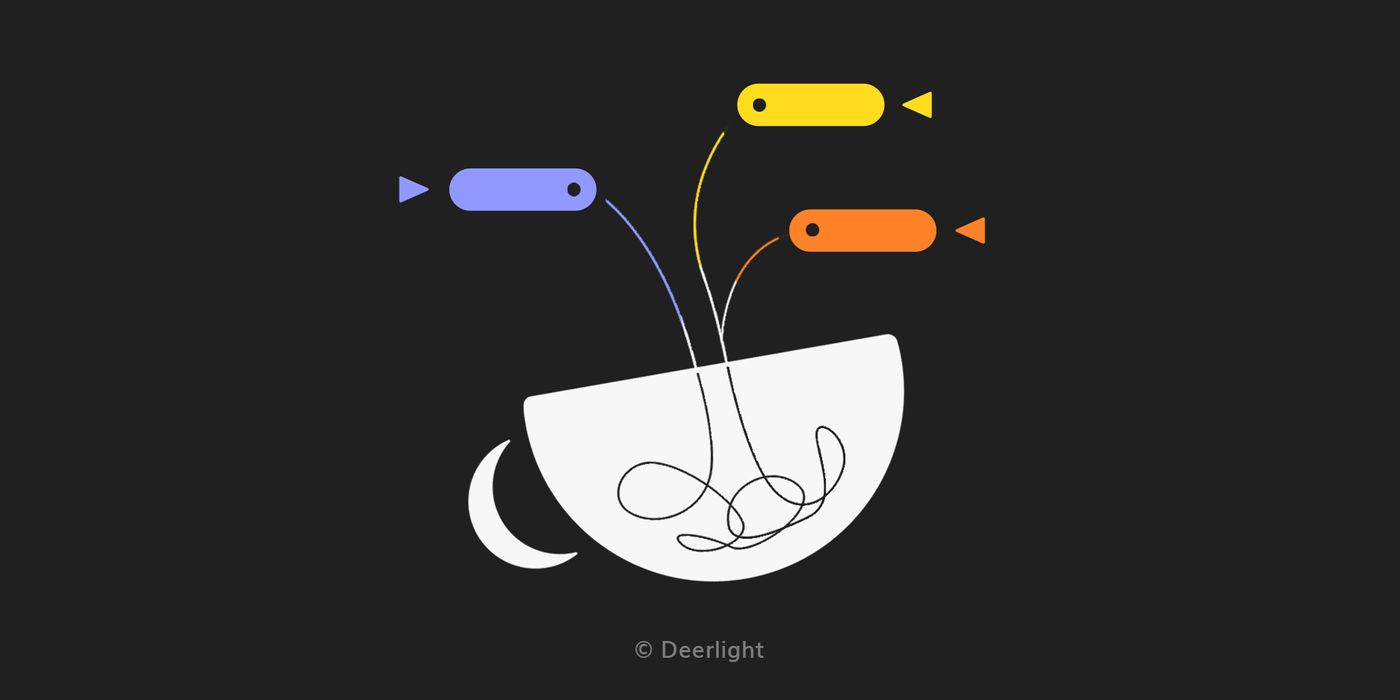
Insecurity, fear of the future, or thinking that you are not doing enough, these "thinking too much" are mixed with "really beneficial planning". The actions of "spread out" and "down" disperse the negative cycle of anxiety.
Outline 1. Introduction 2. Spread out all the thoughts in your mind and classify them 3. Remove unhelpful thoughts and change your thinking patterns 4. Choose appropriate tools for charting 5. Charts - daily time axis 6. Charts - weekly calendar 7. Charts - Calendar 8. Decentralization of ideas 9. Actual implementation 10. Final thoughts
foreword
I often think a lot, and my head can’t stop. As a freelancer, I need to play multiple roles. It seems free but easy to be trapped by my own thoughts. When the workload increases, you will need to allocate your time more carefully, unwittingly putting a lot of stress on yourself and turning into anxiety.
These thoughts are illusory, but they keep churning in the mind. Sometimes they are afraid of forgetting and think harder. If you spread out the thoughts, you can distribute them well, and you can see the connection between them and distinguish between the important ones. , and which ones are unnecessary.
Open up all the thoughts in your head and sort them
At first I would make simple categories, one for very trivial, snippets, and "documentation" forms, and another for goals, work-related ideas.
Use Google Keep to record: trivial, snippets, emotions, short-term records
I will use Google Keep to record very trivial thoughts, because every time I think of them is very trivial, and now there is a record of healthy living plans, the whole looks very large and confusing. However, because Google Keep is too convenient and fast to use, most of them are based on plain text, and they are usually recorded with mobile phones, and the time of each recording is very short.
Because the recorded things are biased towards health and psychology, it is as simple and fast as possible to use!
The healthy life plan has been over two months, with daily uninterrupted records, continuous observation of myself and good habits, and set aside a small period of time to review each day.
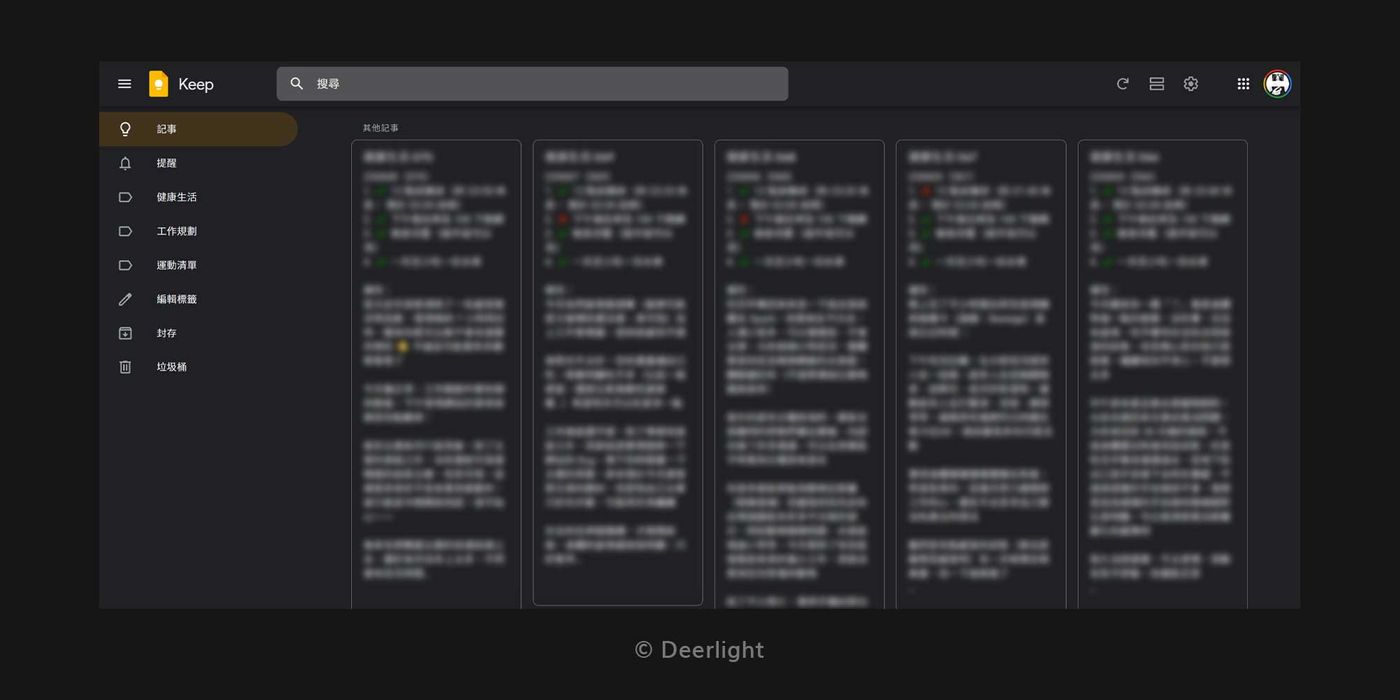
Planning with Miro: work, career, goals, long-term planning
Since the work will span many fields, it is necessary to take into account the complicated things (projects, creation, tutoring, etc.) and also consider the future development. Each project has its own goals to achieve, and sometimes I think too much. Too much, the mind is all taken away.
It is also found that no matter how realistic the imaginary planning is, it will still be inaccurate, because at the moment of planning, it is necessary to remember the details of each item very well, otherwise it is easy to ignore it, which is not only impossible to practice, but also because of the planning. It's bad and has to start all over again.
Later, I learned to use Miro to chart things according to their nature, divide weights, allocate time, make plans, and then I can execute them with peace of mind.
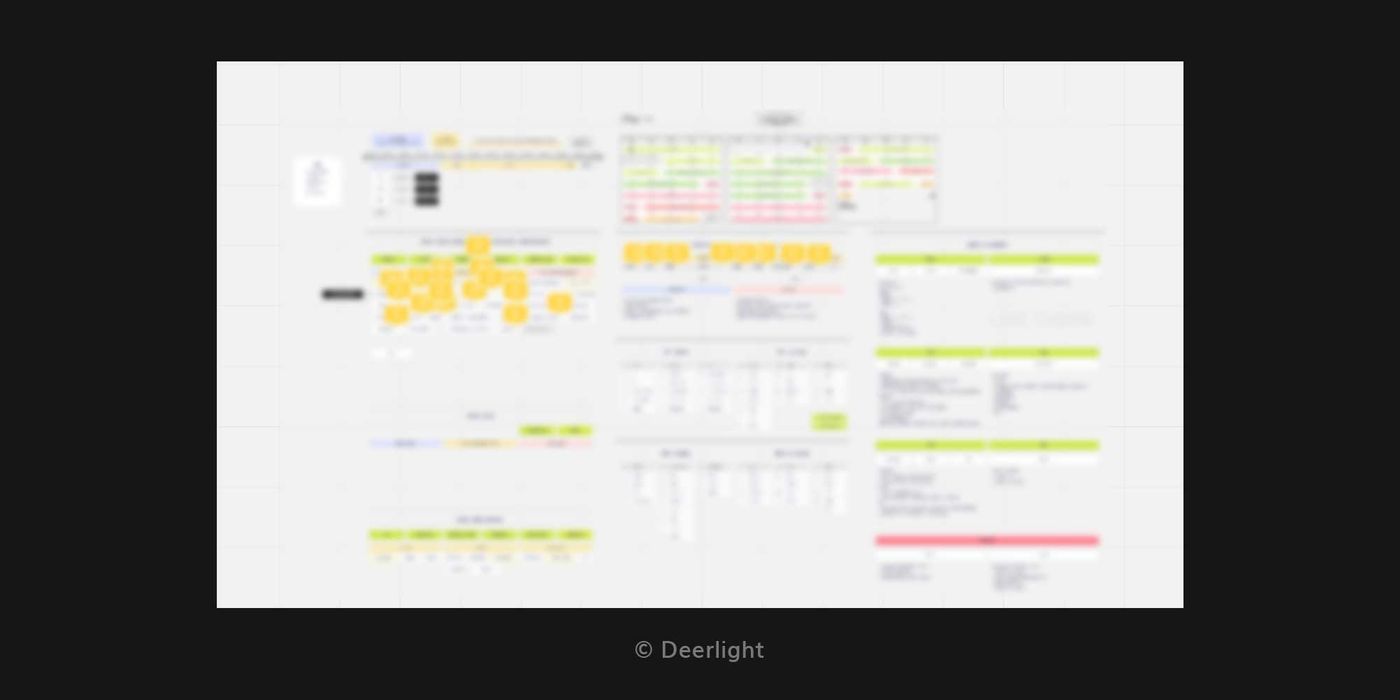
Remove unhelpful thoughts and change thinking patterns
If you have the habit of recording thoughts, you may be able to find where you are starting to dig into the horns. When these thoughts are almost unnecessary worries, you can classify them as: thinking too much and not helpful.
Under normal circumstances, you shouldn't let other people decide whether you think too much, but to find out by yourself, and slowly find a suitable way to reduce the frequency of thinking too much. How can I verify that I really think too much? The solution that works for me is to verify , and after verification, trust your own feelings.
In fact, most of these worries come from a lack of security.
Most unhelpful thoughts are:
negative emotion
After calming down, think back or watch your own record. Do you think too much? Or the moment is a negative thought caused by a situation or emotion.
stop at question
It's not to solve the problem, but to worry about or useless thinking. If you start to have various ideas because of worry, it will be accompanied by the direction of thinking on how to solve the problem.
Avoid always stopping at the question, don't stop at "what to do?", "how can this happen?", but use the question as a starting point to find a solution.
Choose the right tool for charting
Basically, as long as there are tools with chart or flowchart drawing function, you can use it. If you prefer handwriting or hand drawing, you can also draw it yourself.
At present, most of the diagrams are drawn using the Miro online whiteboard.
There are many online software that have the basic functions of "cloud storage, easy management, and collaboration". Most of the rest I will consider are related to vision and experience:
good user experience
The experience of the interface will greatly affect the feeling of the drawing process. Are commonly used components easy to find? Is the screen management and control easy to use? smoothness of operation, etc.
Elasticity with height adjustment
Some tools provide a simpler component design, and there are fewer choices of colors, fonts, and fonts that can be changed. For users who do not have high requirements for visual adjustment, these limitations can focus on the content itself and will not be affected by the appearance.
And I am definitely influenced by the appearance, so whenever I choose a tool, the user experience and the flexibility of height adjustment will become the main consideration.
Perfect alignment function
This is very close to the purpose of the previous point. When drawing diagrams or various components, as well as the connecting line segments between different components, I will try to align and organize them as much as possible to make the picture clear and easy to read.
Chart - Day Timeline
The daily time axis is drawn in order to reduce psychological pressure when the work is the busiest. At the same time, the time distribution is visualized and time distribution is optimized. When my workload is reduced, the time axis is also adjusted accordingly.
Timeline can be used to allocate planning for the whole day, understand how much time can be used in a day, and plan a more realistic arrangement to avoid "too ideal".
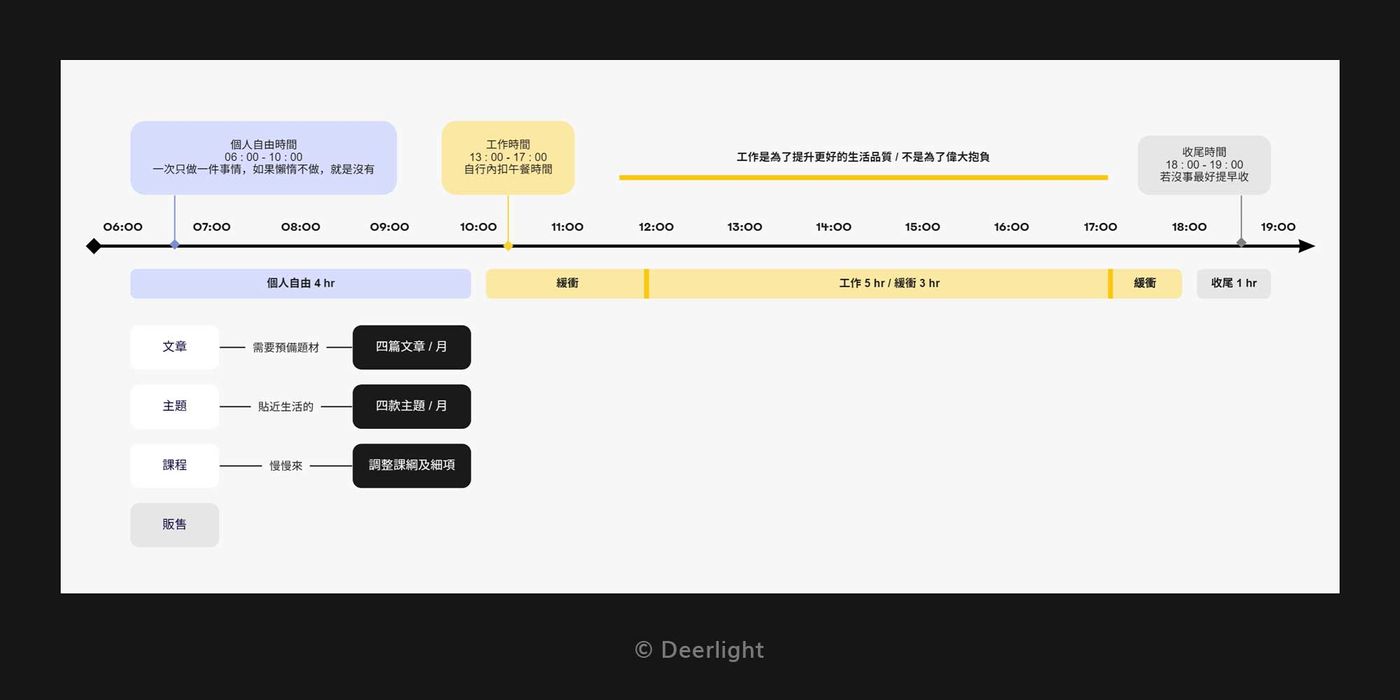
interval in "hours"
Breaking down the units too finely makes the chart difficult to read at a glance; using "hours" as a unit is the best state for me. You can choose the two items of "getting up - going to bed" for the starting and ending time, because there are few other activities between these two items.
Timeline is not just about work
In addition to planning working time, you can also draw daily scheduled items, such as getting up, going to bed, resting, eating, etc. on the timeline, and giving more flexibility to things other than work. For example, you can leave some time to rest after meals. Avoid letting yourself get out of breath.
distinguish different time periods
Because apart from the main project execution, the rest are creations or other routines. In the past, I always did what I thought of, and it was easy to lose my balance or work overtime. Now it will be adjusted according to the current state, for example:
- There are projects to be implemented in the month, so the timeline will be dominated by projects and supplemented by creations.
- If there is no project to be executed in the month, the time axis is evenly distributed to the creation.
Time supplement
If there are many projects to be completed in a certain period, you can make remarks and supplements below the period. For example, during the creation period, what things I hope I can do during this time, maybe writing articles, designing themes , or optimizing the tutoring courses, and the proportion of these things will not be equal, so I will also be in the project Approximate output is noted at the rear.
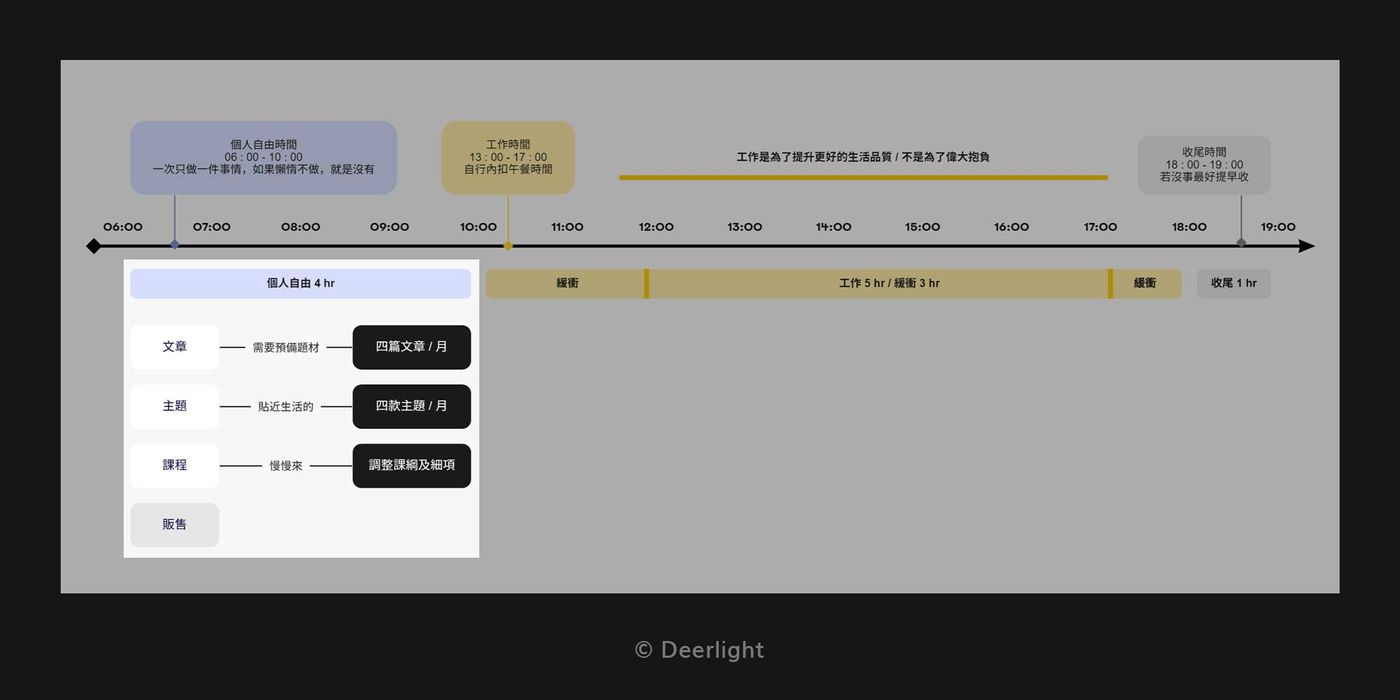
The other parts are the supplements or spiritual shouting that they want to put on.
Chart - Weekly Calendar
Starting from the beginning of May this year, I started the road of joint cooperation and management with my sister. The weekly calendar usually records the posting time of the post, the time of the online weekly meeting (including Dagang's regular discussions in the weekly meeting), the class time, etc., reminding each other. Projects to be completed each week.
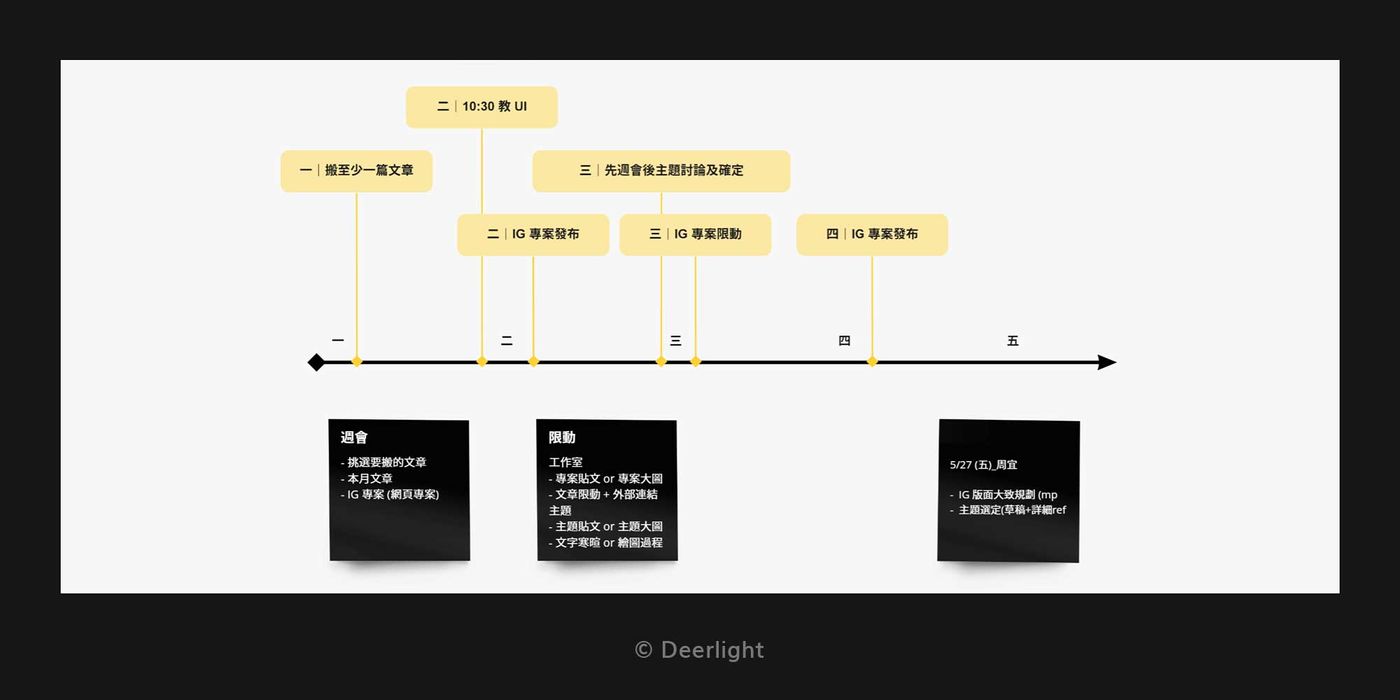
Chart - Monthly Calendar
If there is a longer project, I will make a calendar and put the schedule in the project on it. The reason for this is much clearer by visualizing the timeline than by simply looking at the lines in the quotation.
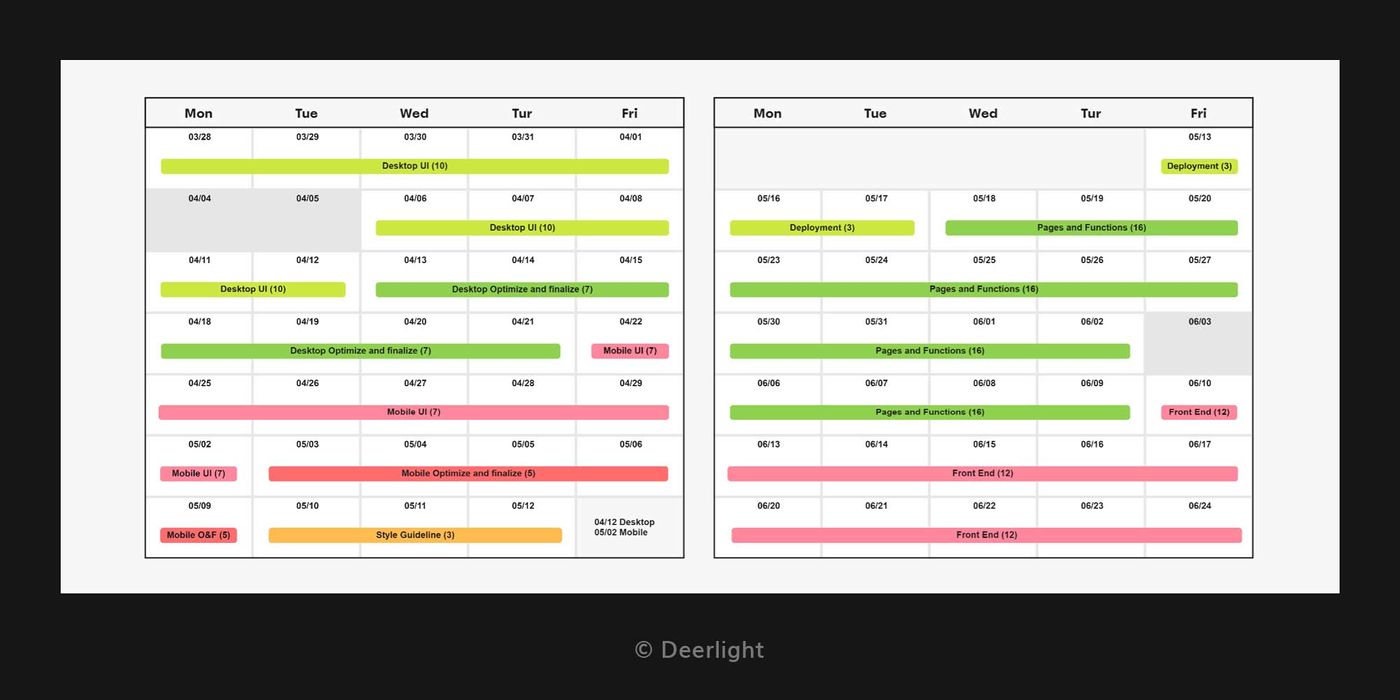
Decentralization
Whether it is written down or drawn into a diagram, I will practice making myself imagine "delegating ideas" and letting them keep these ideas for me, clearing my thoughts, don't be afraid that I will forget, and don't go to the same place for repeated things. Drill down!
We cannot solve today's problems with yesterday's thinking.
Allowing yourself to take a break and come back to think after a while can spark more ideas and bring work-life balance closer. On the other hand, it also diverts attention by decentralizing thoughts, reducing excessive anxiety and increasing a sense of security .
does execute
Some people plan well in advance, but fail in execution.
The key to the effectiveness of these plans is “actual implementation.” In the absence of implementation, it is impossible to verify whether your plan is feasible. If you repeat it over and over again, you will only feel more and more powerless.
continue
After stepping out, maybe you can rest when you are tired, and you can run away when you are afraid, but please at least hold on for a while. Once you start seeing results, you will be more willing to continue and your sense of accomplishment will increase.
stay flexible
Any problems found in the process can be adjusted appropriately to maintain flexibility at any time.
There will be ill-conceived situations in the early stage. The time allocation that was thought to be perfect turns out to be taking more time than expected.
Most of them are caused by inexperience (a few may be lack of ability). At this time, you can adjust the time plan appropriately, or prioritize the important things first, and don’t greedily want to achieve everything in one go.
The last thought
There is no big problem with execution, most of them are affected by their own anxiety, moderately increase their sense of security, divert their attention, let themselves concentrate on the things in front of them, and relax and enjoy life.
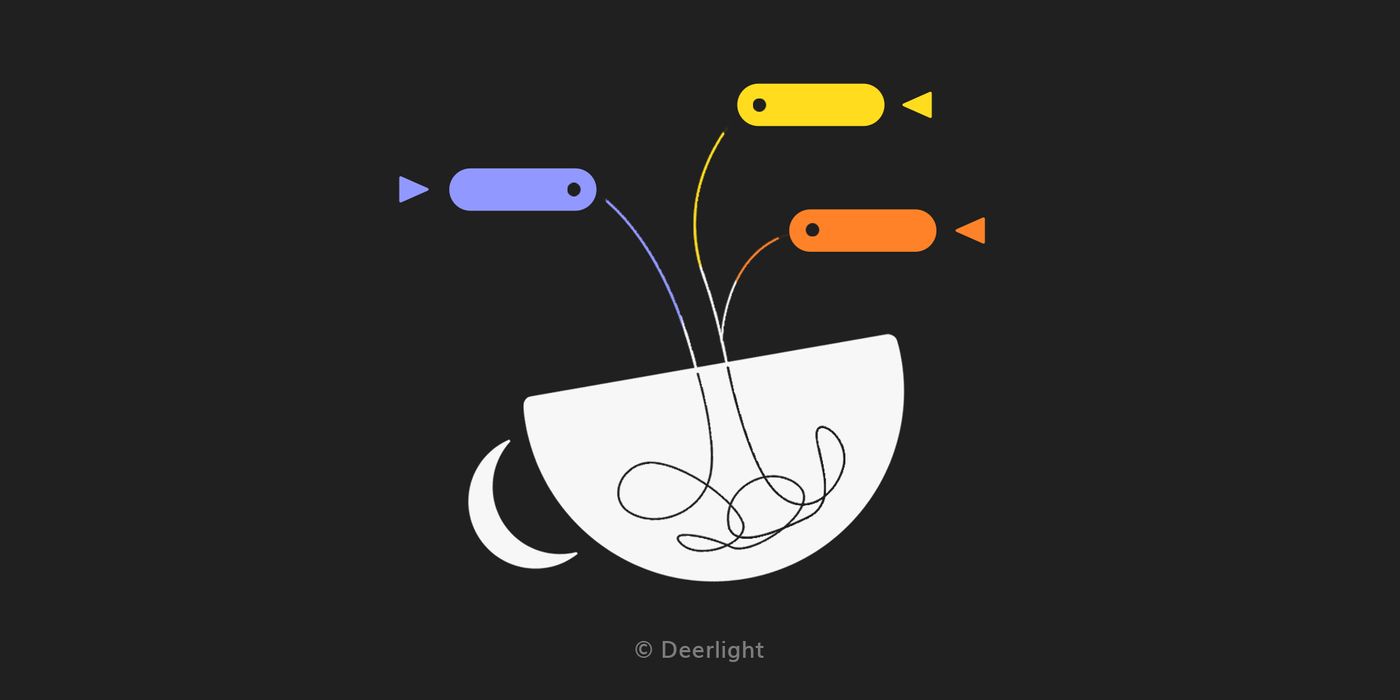
The key to reducing anxiety is not the content of the record, but the action of “spreading out” and “delegating” thoughts.
The article was first published on Medium , and the version I'm currently reading is the synchronous version.
Thank you for your reading and support, any questions are welcome to communicate with us| imjhanemi@gmail.com
Like my work? Don't forget to support and clap, let me know that you are with me on the road of creation. Keep this enthusiasm together!



- Author
- More